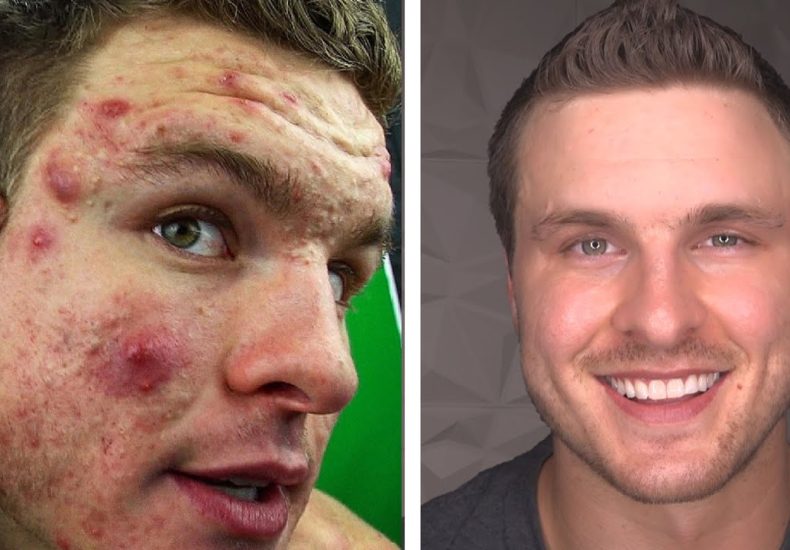
How To Get Rid of Your Acne Forever
How To Get Rid of Your Acne Forever
Please scroll down to watch the video.👇👇
Getting rid of acne permanently involves a combination of lifestyle changes, consistent skincare, and sometimes medical treatment. Here’s a detailed guide to help you understand the process, backed by scientific references and expert advice.
✅ Step-by-Step: How to Get Rid of Acne Forever
1. 🧼 Establish a Gentle Daily Skincare Routine
-
Cleanse twice a day with a gentle, non-comedogenic cleanser (e.g., Cetaphil, CeraVe).
-
Use lukewarm water, not hot, which can irritate the skin.
-
Avoid scrubbing — it worsens inflammation.
📚 Reference: American Academy of Dermatology (AAD) – Basic Skincare
2. 💊 Use Proven Topical Treatments
The following ingredients are clinically proven to reduce and prevent acne:
-
Benzoyl Peroxide – kills acne-causing bacteria.
-
Salicylic Acid – exfoliates pores and prevents blockages.
-
Retinoids (e.g., adapalene) – regulate skin cell turnover.
-
Niacinamide – reduces inflammation and redness.
📚 Reference: Mayo Clinic –
3. 🧬 Consider Prescription Medications (If Needed)
For moderate to severe or hormonal acne, dermatologists may recommend:
-
Oral antibiotics (e.g., doxycycline)
-
Oral contraceptives or spironolactone (for hormonal acne in women)
-
Isotretinoin (Accutane) – for severe or cystic acne (can offer permanent results in many cases)
📚 Reference: Cleveland Clinic – Acne Medications
4. 🍽️ Modify Your Diet
-
Reduce high glycemic foods (e.g., sugary snacks, white bread).
-
Limit dairy, especially skim milk, which may worsen acne in some.
-
Eat more omega-3 fatty acids, zinc, and vitamin A-rich foods.
📚 Reference: Journal of the American Academy of Dermatology – Diet and acne
5. 🧠 Manage Stress
Stress increases oil production and inflammation.
-
Practice mindfulness, yoga, or meditation.
-
Get adequate sleep and maintain a regular routine.
📚 Reference: National Institutes of Health (NIH) –
6. 🚫 Avoid These Common Mistakes
-
Don’t pop pimples – it worsens inflammation and may lead to scarring.
-
Avoid over-washing or harsh exfoliants.
-
Don’t mix too many active ingredients at once (e.g., salicylic acid + retinoid + benzoyl peroxide without professional advice).
7. 🩺 Consult a Dermatologist
If over-the-counter methods don’t work within 2–3 months, see a board-certified dermatologist. Acne is a medical condition and may need a tailored prescription plan.
📚 Find a dermatologist: AAD Directory
💡 Summary: Long-Term Acne Control
| Method | Effectiveness | Best For |
|---|---|---|
| OTC Topicals | Moderate | Mild to moderate acne |
| Prescription Topicals | High | Moderate to severe acne |
| Oral Medications | Very high | Severe, hormonal, cystic |
| Diet & Lifestyle Changes | Moderate | All acne types |
Achieving permanent relief from acne involves a multifaceted approach that combines consistent skincare, medical treatments, lifestyle adjustments, and, in some cases, advanced therapies. Here’s an in-depth guide, supported by reputable sources, to help you navigate this journey.
🧼 1. Establish a Consistent Skincare Routine
A gentle and consistent skincare regimen is foundational in managing acne:
-
Cleanse Twice Daily: Use a mild, non-comedogenic cleanser to remove excess oil and impurities.
-
Moisturize: Even oily skin needs hydration. Opt for oil-free, non-comedogenic moisturizers.
-
Sun Protection: Apply a broad-spectrum sunscreen with at least SPF 30 daily to protect the skin and prevent post-inflammatory hyperpigmentation.
Reference: American Academy of Dermatology – Acne: Tips for managingAmerican Academy of Dermatology
💊 2. Utilize Proven Topical Treatments
Topical agents are effective for mild to moderate acne:
-
Benzoyl Peroxide: Reduces bacteria and has anti-inflammatory properties.
-
Salicylic Acid: Helps unclog pores and reduce swelling.
-
Retinoids (e.g., Adapalene): Promote cell turnover and prevent clogged pores.
Reference: Mayo Clinic – Acne: Diagnosis and treatmentMayo Clinic
💊 3. Consider Prescription Medications for Moderate to Severe Acne
For persistent or severe cases, medical intervention may be necessary:
-
Oral Antibiotics: Reduce inflammation and bacterial growth.
-
Hormonal Therapies: Such as oral contraceptives or anti-androgens like spironolactone, particularly effective in women.
-
Isotretinoin (Accutane): A potent option for severe cystic acne, requiring close medical supervision due to potential side effects.
Reference: Cleveland Clinic – Acne: Types, Causes, Treatment & PreventionCleveland Clinic+1Wikipedia+1
🧬 4. Explore Advanced Therapies
Emerging treatments offer alternatives for those unresponsive to conventional therapies:
-
AviClear Laser Therapy: An FDA-approved laser treatment targeting sebaceous glands to reduce oil production, showing significant improvement in acne severity.
Reference: The Times – A game-changing new acne treatmentThe Times
🍽️ 5. Implement Dietary and Lifestyle Modifications
Lifestyle factors can influence acne development:
-
Diet: Adopt a low-glycemic diet rich in whole foods; some studies suggest omega-3 fatty acids may help reduce inflammation.
-
Stress Management: Practice stress-reducing techniques like meditation or exercise, as stress can exacerbate acne.
Reference: New York Post – Omega-3 algae supplements may help ease acnenypost.com
🩺 6. Consult a Dermatologist
If over-the-counter treatments are ineffective after several weeks, seek professional advice. A dermatologist can provide personalized treatment plans and monitor for potential side effects.
Reference: American Medical Association – What doctors wish patients knew about acne treatmentAmerican Medical Association
🧾 Summary Table
| Treatment Approach | Best For | Notes |
|---|---|---|
| Gentle Skincare Routine | All acne types | Foundation of acne management |
| Topical Treatments | Mild to moderate acne | Includes benzoyl peroxide, salicylic acid, retinoids |
| Prescription Medications | Moderate to severe acne | Requires medical supervision |
| Advanced Therapies | Resistant severe acne | Includes laser treatments like AviClear |
| Dietary & Lifestyle Changes | All acne types | Supports overall skin health |
| Dermatologist Consultation | Persistent or severe acne | Essential for personalized treatment |

Leave a Reply